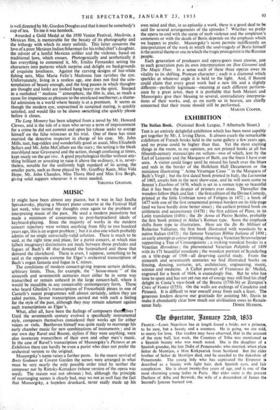MUSIC
IT might have been almost any pianist, but it was in fact Jascha Spivakovsky, playing a Mozart piano concerto at the Festival Hall last week, who turned my thoughts once again to the problem of interpreting music of the past. He used a modern pianoforte but made a minimum of concessions to post-harpsichord ideals of keyboard-Vlaying. Since the majority of works in the modern -concert repertory were written anything from fifty to two hundred years ago, this is an urgent problem ; but it is also one which probably admits of no single universally-valid solution. There is much to be said, at the right time and place, for a purist concert, at which nice (albeit imaginary) distinctions are made between those preludes and fugues of Bach's 48 that demand the harpsichord and those that demand the clavichord. There is even, I suppose, something to be said at the opposite extreme for Elgar's orchestral transcription of Bach's organ fantasia and fugue in C minor.
The conditions of modem concert-giving impose certain definite, arbitrary limits. Thus, for example, the " house-music " of the sixteenth and seventeenth centuries must either be in some way transcribed or remain unheard in the large concert-hall, where it would be inaudible in any conceivably contemporary form. Those who heard Ghedini's transcriptions of Frescobaldi pieces in one of Cantelli's recent programmes will almost certainly, unless they are rabid purists, favour transcription carried out with such a feeling for the style of the past, although they may remain adamant against such transcriptions as Elgar's. What, after all, have been the feelings of composers therritives ? Until the seventeenth century evolved a specifically instrumental style, composers themselves considered their works apt for either voices or viols. Beethoven himself was quite ready to rearrange his early chamber music for new combinations of instruments ; and in our own day Ravel and Busoni, stylists if they were anything, were also inveterate transcribers of their own and other men's music. In the case of Ravel's transcription of Mussorgslcy's Pictures at an Exhibition there can hardly be even a purist who does not prefer the orchestral version to the original.
Mussorgsky 's name raises a further -point. In the recent revival of Boris Godunov at Covent Garden the scenes were arranged in what must be very nearly the only possible order tried by neither the composer nor by Rimsky-Korsakov (whose yersion of the opera was used). The reason was not obvious ; but, although the principle of rearranging scenes is clearly bad, may we not as well face the fact that Mussorgsky, , a hopeless drunkard, never really made up his
own mind and that, in so episodic a work, there is a good deal to be said for several arrangements of the episodes ? Whether we prefer the opera to end with the scene of mob violence and the simpleton's comments or with the death of Boris depends on the emphasis which we happen to prefer. Mussorgsky's score permits indifferently an interpretation of the work in which the soul-tragedy of Boris himself is the central theme or one in which the tragic protagonist is the Russian people.
Each gcneration of producers and opera-goers must choose, just as each generation puts its own interpretation on Don Giovanni and The Magic Flute. In a sense each of these three operas owes its vitality to its shifting, Protean character ; each is a diamond which sparkles at whatever angle it is held to the light. And, if Busoni could claim that every great work had a new life and a slightly different—perfectly legitimate—meaning at each different perform- ance by a great artist, then it is probable that both Mozart and Mussorgsky give their blessing to several, contradictory interpreta- tions of their works, and, as on earth so in heaven, are chiefly concerned that their music should still be performed.
MARTIN COOPER.


































 Previous page
Previous page